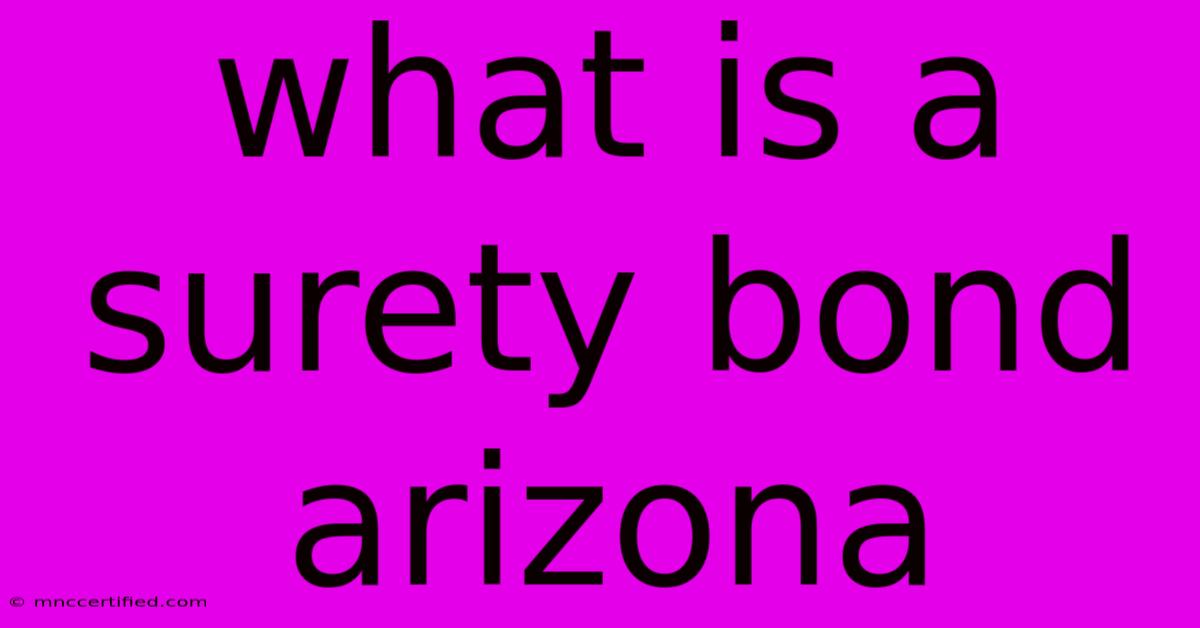What Is A Surety Bond Arizona

Table of Contents
What is a Surety Bond in Arizona? A Comprehensive Guide
Arizona, like many states, utilizes surety bonds in various contexts to ensure contractual obligations are met and protect parties involved in legal and financial transactions. Understanding what a surety bond is, how it works, and its implications in Arizona is crucial for businesses and individuals alike. This comprehensive guide will clarify the intricacies of surety bonds in the Grand Canyon State.
What is a Surety Bond?
A surety bond isn't insurance; it's a three-party agreement involving:
- The Principal: The individual or business required to obtain the bond. They are the ones legally obligated to fulfill a specific contract or meet a legal requirement.
- The Obligee: The party protected by the bond. This could be a government agency, a client, or another individual. The obligee receives compensation if the principal fails to meet their obligations.
- The Surety: A financially stable insurance company or bonding agency that guarantees the principal's performance. If the principal defaults, the surety pays the obligee up to the bond amount.
Essentially, the surety bond acts as a financial guarantee, ensuring the obligee that the principal will fulfill their responsibilities. Failure to do so triggers a claim process where the surety steps in to cover the losses.
Types of Surety Bonds in Arizona
Arizona requires surety bonds in several situations, including but not limited to:
1. Contractor License Bonds:
This is perhaps the most common type of surety bond in Arizona. Contractors are legally required to obtain a surety bond to obtain a contractor's license. This protects homeowners and other clients from financial losses if the contractor fails to complete the job as agreed or performs substandard work. The bond amount varies depending on the contractor's classification and the type of work performed. Finding the right surety bond for your contracting business in Arizona is vital for legal compliance and client trust.
2. Court Bonds:
Various legal proceedings in Arizona necessitate court bonds. These bonds guarantee court appearances, payment of judgments, or the fulfillment of court orders. Examples include:
- Fiduciary Bonds: Required for individuals managing estates or trusts.
- Bail Bonds: Secure the release of an arrested individual awaiting trial.
- Appeals Bonds: Guarantee payment of court costs if an appeal is unsuccessful.
3. Public Official Bonds:
Public officials in Arizona often need surety bonds to ensure they handle public funds and resources responsibly. This protects taxpayers from potential misuse of funds.
4. License and Permit Bonds:
Beyond contractors, other professions and businesses in Arizona may require surety bonds to obtain licenses or permits. These bonds ensure compliance with regulations and protect the public.
How to Obtain a Surety Bond in Arizona
The process typically involves:
- Determining the required bond amount and type: This depends on the specific requirement.
- Applying to a surety company: Numerous surety companies operate in Arizona. Research and compare options based on their reputation and rates.
- Providing necessary documentation: This often includes financial statements, personal information, and business information.
- Paying the bond premium: The premium is a percentage of the bond amount and is paid annually. Remember, this is not the full bond amount; it's the cost of the surety's guarantee.
- Receiving the surety bond: Once approved, the surety company issues the bond.
Understanding Bond Premiums and Costs
The cost of a surety bond in Arizona is expressed as a premium, usually a percentage of the total bond amount. This premium is an annual fee. Factors influencing the premium include:
- Bond amount: Higher bond amounts generally result in higher premiums.
- Principal's credit history: A good credit history can lead to lower premiums.
- Type of bond: Different types of bonds carry different risk profiles and hence, premiums.
- Surety company: Surety companies have varying pricing structures.
Arizona Surety Bond FAQs
- What happens if a claim is filed against my bond? The surety company investigates the claim. If the claim is valid, the surety company pays the obligee, then pursues recovery from the principal.
- Can I get my bond cancelled? This depends on the specific bond and the circumstances. Cancellation is usually possible after fulfilling the obligations.
- Where can I find a licensed surety bond provider in Arizona? A simple online search for "surety bonds Arizona" will yield numerous results. Verify the surety company's license and reputation before engaging their services.
Conclusion: Surety bonds are a fundamental aspect of Arizona's legal and business landscape. Understanding their function, types, and acquisition process is vital for anyone involved in contracting, legal proceedings, or public service. Remember to always work with a reputable surety bond provider to ensure compliance and protect your interests. This guide provides a starting point; always consult with legal professionals for specific advice tailored to your circumstances.

Thank you for visiting our website wich cover about What Is A Surety Bond Arizona. We hope the information provided has been useful to you. Feel free to contact us if you have any questions or need further assistance. See you next time and dont miss to bookmark.
Featured Posts
-
George Dickle Bottled In Bond
Nov 28, 2024
-
Trader Joes Thanksgiving Day Hours
Nov 28, 2024
-
Eagle Trading Company Brooklyn
Nov 28, 2024
-
Where To Buy Stronghold Token
Nov 28, 2024
-
Rooney Attacks Plymouth Players
Nov 28, 2024